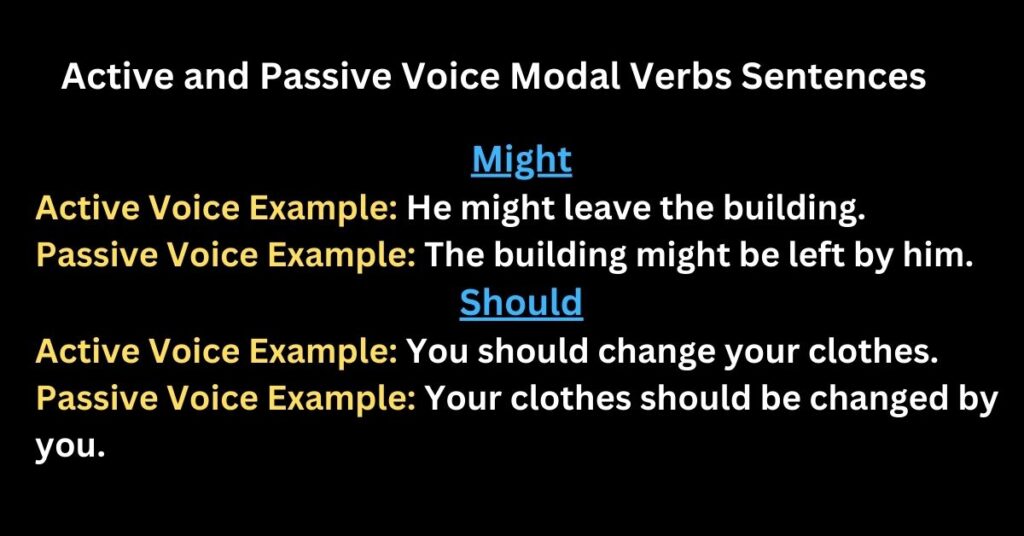This post includes a detailed description of Active and Passive Voice Modal Verbs Sentences along with the rules and examples of passive voice formation of imperative sentences.
Table of Contents
In this blog, you will learn the following:
- What is an Imperative Sentence?
- Active and Passive Voice of Imperative Sentences
- Examples of Active and Passive Voice of Imperative Sentences
- Modal Verbs in Active and Passive Voice
- Changes of Modal verbs of Present, Past, and Future
- Examples of Active and Passive Voice of Modal verbs
Imperative Sentences
What is an Imperative Sentence?
When One Makes A Request, Offers Advice, Issues A Command, A Warning, Or Gives An Instruction, we call it The Imperative Mood.
Sentences That Use the Imperative Mood we call them Imperative Sentences.
An Imperative Sentence Is A Sentence That Tells Somebody To Do Something.
Imperative Sentence Structure:
Positive Sentence:
Active Voice Structure: 1st Form of Verb + Object
Active Voice Example: Close the door.
Passive Voice Structure: Let + Object + be + 3rd Form of Verb
Passive Voice Example: Let the door be closed.
Imperative Sentence Negative Form
Active Voice Structure: Do + not + 1st Form of Verb + Object
Active Voice Example: Do not close the door.
Passive Voice Structure:Let + Object + not + be + 3rd Form of Verb/Let +not + Object +be +3rd form of verb
Passive Voice Example: Let the door not be closed. / Let not the door be closed.
Let’s look at the Active and Passive Voice Modal Verbs Sentences
Modal Verbs:
| Active to Passive Changes of Present and Future Modal Verbs | |
| Active Voice | Passive Voice |
| Can | Can be |
| Ought to | Ought to be |
| May | May be |
| Might | Might be |
| Must | Must be |
| Should | Should be |
| Active to Passive Changes of Past Modal Verbs | |
| Active Voice | Passive Voice |
| May have | May have been |
| Might have | Might have been |
| Should have | Should have been |
| Must have | Must have been |
| Ought to have | Ought to have been |
Example Sentences:
Can
Active Voice Example: He can break the law.
Passive Voice Example: The law can be broken by him.
May
Active Voice Example: You may change your clothes.
Passive Voice Example: Your clothes may be changed by you.
Might
Active Voice Example: He might leave the building.
Passive Voice Example: The building might be left by him.
Should
Active Voice Example: You should change your clothes.
Passive Voice Example: Your clothes should be changed by you.

Must
Active Voice Example: He must eat some food.
Passive Voice Example: Some food must be eaten by him.
Ought to
Active Voice Example: You ought to take the examination.
Passive Voice Example: The examination ought to be taken by you.
May have
Active Voice Example: You may have availed the opportunity
Passive Voice Example: The opportunity may have been availed by you.
Might have
Active Voice Example: They might have taken the examination.
Passive Voice Example: The examination might have been taken by them.
Should have
Active Voice Example: He should have passed the exam.
Passive Voice Example: The exam should have been passed by him.
Must have
Active Voice Example: He must have started the work.
Passive Voice Example: The work must have been started by him.
Ought to have
Active Voice Example: You ought to have helped him.
Passive Voice Example: He ought to have been helped by you.
Frequently Asked Questions:
Q1: What is an Imperative Sentence?
Ans: When One Makes A Request, Offers Advice, Issues A Command, A Warning, Or Gives An Instruction, we use The Imperative Mood. Sentences That Use the Imperative Mood we call them Imperative Sentences. An Imperative Sentence Is A Sentence That Tells Somebody To Do Something.
Q2: What is a modal verb?
Ans: Modal verb is a type auxiliary verb that shows possibility, intent, ability, or necessity. We use them with the main verbs. Some common examples of modal verbs are can, could, should, and would.
Final Words
This article discusses the Active and Passive Voice Rules and Examples (Imperative Sentences and Modal Verbs of Present, Past, and Future). To watch the video lecture of the same, watch the video given below:
